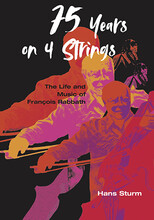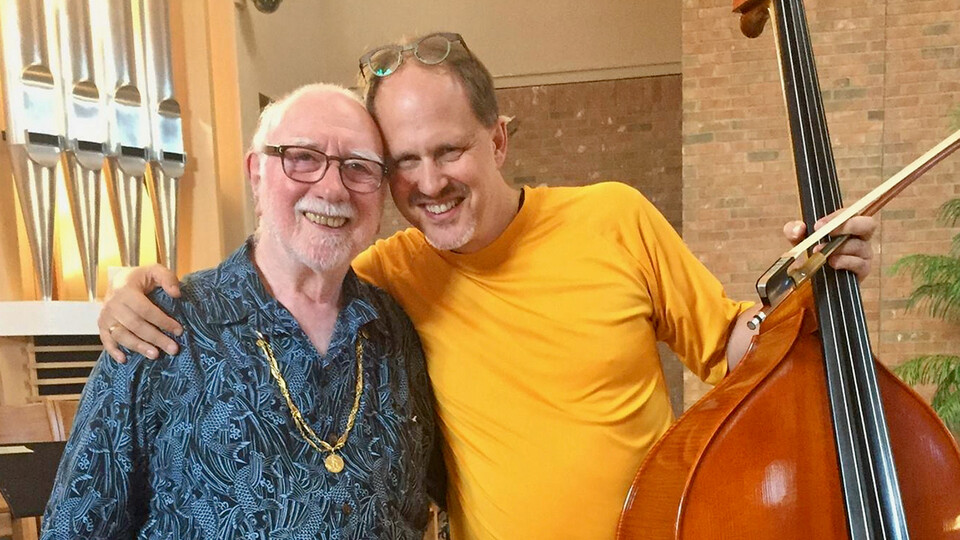Kathe Andersen, January 13, 2022
Sturm’s new book is biography of influential bassist Rabbath
Nebraska’s Hans Sturm has written a biography about François Rabbath, a French double-bass virtuoso, soloist and composer who has influenced countless bassists around the world.
The book, “75 Years on 4 Strings: The Life and Music of François Rabbath,” will be published in early 2022 and is available for pre-sale.
Rabbath, who is now 90 years old, is renowned in the bass world for his innovative left-hand technique and pedagogy that has revolutionized the way the bass is played and taught. Sturm, a professor of double bass and jazz studies in the Hixson-Lied College of Fine and Performing Arts, has worked with Rabbath since 2000.
“I’ve known about him for a lot longer, since the early 80s when he first kind of came out,” Sturm said. “I went and studied with him. I would go over two to three times a year, starting in 2000, and that led to the creation of the two DVDs that I produced called ‘The Art of the Bow’ and ‘The Art of the Left Hand.’”

Cover of Sturm’s new book. The biography is available for pre-order.
Those DVD’s utilized cutting-edge technology, including user-selectable angles and biomechanics animations, to unearth the subtle artistry of Rabbath. The work led to deeper conversations and Sturm became interested in Rabbath’s stories.
“One of the things that’s so fascinating about François is his history and background,” Sturm said. “In making the DVDs, we would talk about his philosophy, then he would tell another story about his past. Each one he would recall, then that would bring to mind another one.”
Rabbath was born in Aleppo, Syria, in 1931 to a family of musicians. His brothers played together in a local café, and then left for a gig in Damascus for three months. After three months, they returned and the then-12-year-old Rabbath was excited to see them.
“Elie tells François to do him a favor and run up to his room to get him a handkerchief,” Sturm said. “And so François, wanting to please, runs up to the room, and there’s a bass in the corner of the room. François knows he’s not supposed to touch his brother’s instruments, but he can’t resist the big instrument. He goes over to it and plucks the string, and he says the window rattles and the whole room shakes. He runs downstairs and goes over to his brother and blurts out ‘What’s that fat violin in your room?’ And he says, ‘First of all, it’s not a violin, it’s a bass.’ And François says, ‘Well, who is it for?’ And Elie said, ‘Who wants it?’ So François said, ‘I can take it?’ And he says yes, and by God, you’ll join the band immediately.’
“And I think that’s a big reason why he embraced the bass. Because as long as he can play the bass, he wouldn’t be separated from his brothers again.”
Eventually, the family moved to Beirut, and the brothers played at the Hotel Normandy during the dinner hour, and then played at the nearby Kit Kat nightclub at night. Sturm said the great violinist Yehudi Menuhin one time saw Rabbath play at the Hotel Normandy.
“François was often playing in the upper register with the bow melodies from popular tunes, and Menuhin was impressed and said let me see your fingers,” Sturm said. “And he saw that François had a single line across his fingers, and he said, ‘Oh you see, I have the same. You will go far.’ And François said, ‘But your line is so thin.’ And he said ‘Yes, of course, I’m a violinist, and you’re a bassist.’ But that was very encouraging to him. He was maybe 18 years old at the time, and one of the world’s great violinists happened to be in Beirut and encouraged him.”
Rabbath eventually emigrated to Paris. The brothers performed with singer Charles Aznavour. After a performance in Monte Carlo, Quincy Jones, who had a European big band around this time and was named as the first black vice president of Mercury Records, asked Rabbath if he had a demo.
“François said no, and Quincy says, ‘Well, if you make a demo, be sure to send it to me,’” Sturm said.
Rabbath booked time at Philips Recording Studio, but before he could record it, the manager of the studio offered him a contract after learning of Jones’ interest in Rabbath.
“He made a demo of three tunes, one by his brother Pierre, one by a friend, and the third was just kind of a thing he was working on with the bass and drums, and the Philips Committee loves that, and says they want more of that,” Sturm said. “So this record comes out, ‘The Sound of a Bass,” which is bass and drums.”
The recording launched his career, which has included performing, as well as composing for film and theatre.
“For the bass world, I can say he completely revolutionized the way the bass is played,” Sturm said.
In Rabbath’s method, the entire fingerboard is divided into only six positions, made possible with a technique called pivoting. His methods focus on the use of the left hand and his detailed attention to the bow arm.
For Sturm, both the book and his relationship with Rabbath are personal.
“He has completely changed the way that I play, approach, teach and think about this instrument,” Sturm said. “The second thing I can say is his generosity, and the infectiousness of how he gives and how he wants everybody to grow. And then lastly, it’s his love of humanity. There is this bit of the story that comes back several times where he’s rejected in one way or the other. And he always comes back to the bass. It’s the sharing of love through the music.”
Sturm said preserving Rabbath’s stories was a dream project for him.
“François has had such a profound influence on my life and the lives of so many of my friends and colleagues—everyone I contacted to share their experiences were eager to participate,” he said. “For me, to play a part in telling his life’s story has been a great honor. My hope is that readers will enjoy the stories and come away with an appreciation of his marvelous life in music, and, perhaps, learn from his experiences as he originally intended.”






